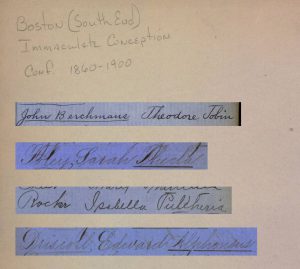 Behind the scenes, the NEHGS web team is hard at work preparing the searchable version of our Roman Catholic Archdiocese records. As part of that process, our volunteers create spreadsheets that associate information with a specific image file. I proofread these spreadsheets as part of our quality control process.
Behind the scenes, the NEHGS web team is hard at work preparing the searchable version of our Roman Catholic Archdiocese records. As part of that process, our volunteers create spreadsheets that associate information with a specific image file. I proofread these spreadsheets as part of our quality control process.
I’ve recently encountered some confirmation records and was intrigued by their potential value to genealogists. Most confirmation records do not contain parents’ names – they usually just consist of a last name, first name, date, and maybe a sponsor. Many of the confirmands also have a confirmation name recorded. In Catholic tradition, confirmation names were a way to honor a saint that you might feel close to, admire, or want to emulate. While I doubt many genealogical facts can be proven by confirmation names, they can be a small window into the personality of your ancestor. Why did they choose that specific saint? Did they find meaning in whatever that saint might be the patron of?
In Catholic tradition, confirmation names were a way to honor a saint that you might feel close to, admire, or want to emulate.
In two non-historical examples, my childhood friend’s confirmation name is Cecilia, which she chose because St. Cecilia is the patron of music, and my friend is very musically talented. I’ve always liked St. Claire, whose feast day is my birthday.
As I was proofreading, a few of the more unusually named saints caught my eye – as the proofreader, I’m always looking out to make sure what is written in the spreadsheet matches what is written on the page. I encountered the following confirmation names adopted by confirmands of Immaculate Conception in Boston between 1860 and 1900.
St. Pulcheria was a Byzantine empress who was deeply involved in ecclesiastical councils. She was a strong political and religious leader. Perhaps Isabella Rocher admired Pulcheria’s leadership abilities and commitment to keeping her vows.
St. Thecla was an early saint who was inspired to Christianity by St. Paul. She was very committed to her vow of chastity. She miraculously survived multiple attempts to make her a martyr. While stories about her life vary a little, she seems to have been very learned and she became a healer. Sarah Foley may have admired her bravery in the face of wild beasts, her devotion to God, her scholarship, or her medical propensity.
Perhaps Isabella Rocher admired Pulcheria’s leadership abilities...
St. John Berchmans was a Jesuit scholar who studied philosophy. He is the patron saint of altar servers. Accounts of his life extol how he melded spirituality with ordinary aspects of everyday life. Maybe Theodore Tobin or William Harahan were altar servers, or maybe they respected St. John Berchmans’s quotidian connection with God.
St. Alphonsus was an Italian lawyer who in the 1700s who became a priest and eventually a bishop. He was known for ministering to the poor and preaching plainspoken sermons that could be understood by all. He wrote many theological treatises as well as hymns. Six young men from Immaculate Conception took St. Alphonsus’s name, perhaps inspired by his clear oratory, musical talent, or devotion to the underprivileged.
Subscribe to our Database News blog to be updated on when this searchable collection will be live; we’re anticipating we’ll be able to launch it soon! We’re excited for researchers to have the chance to search this collection themselves.
Share this:

About Molly Rogers
Molly is from York, PA. She studied English and French at Colby College in Maine and has a Master’s degree in Library and Information Science from Simmons College. She enjoys many outdoor pursuits such as whitewater kayaking, mountain biking and cross-country skiing and has a few indoor hobbies like reading, knitting and creating a genealogy website for her grandmother’s family.View all posts by Molly Rogers →